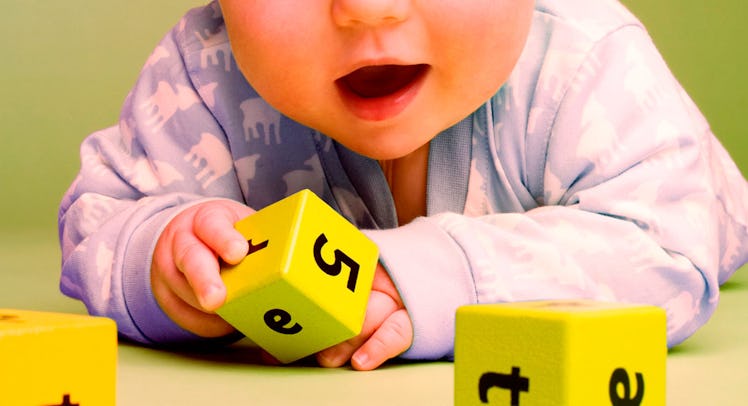Babies Develop Logic And Reason Before Language, New Data Shows
New findings indicate that children begin to reason logically well before they can speak or receive instruction.

Long before your baby can talk, he or she is capable of deductive reasoning, according to a new study in Science. Researchers showed logical and illogical animated videos to preverbal one-year-olds and found that they spent more time staring at illogical scenarios than logical ones. The findings indicate that children may learn to reason before they can speak, and that the development of deductive reasoning is not necessarily linguistically based, as once thought.
“Are logical structures and abilities something we learn at school or with the language of our parents? Or is rather something more deeply nested in our nature?” asked coauthor on the study Nicolò Cesana Arlotti of the Pompeu Fabra University in Barcelona. “Our results indicate the presence of a precursor of the process of elimination in infants as young as 12 months.”
There aren’t very many scientific studies that examine how infants and toddlers experience logic. That’s because it’s tricky to figure out what preverbal children are thinking. Most logic tests involve asking a question and waiting for an answer or at least asking participants to physically respond to logical and illogical scenarios. But infants seldom cooperate and rarely offer noteworthy responses. “In absence of empirical findings, radically opposing views emerged,” Cesana-Arlotti says. In one corner stood the Swiss psychologist Jean Piaget, who surmised that logical reasoning begins at 11 years of age and represents peak cognitive development. In the other corner, the philosopher Jerry Fodor, who claimed that the fundamental components of logic cannot be learned, and may exist from birth.
Cesana-Arlotti and colleagues resolved to chip away at this debate by studying one fundamental form of logic in children, known as disjunctive syllogism. It’s a mouthful of a term, but simple enough to define. If only A or B can be true, and A is false, then B must be true. It’s basically the process of elimination writ small. Cesana-Arlotti calls disjunctive syllogism “a fundamental logical inference that allows drawing a conclusion by trimming a space of alternatives. ‘I have left my laptop either at home or in the lab; my laptop is nowhere in the lab; therefore, it has to be at home.’”
For the study, Cesana-Arlotti and his team showed brief animated videos to one-year-olds. There were several scenarios, but one involved a snake and a beach ball. Both appear on the screen, and are then hidden behind a wall. An animated cup dips behind the wall, removing the snake. By process of elimination, the object remaining behind the wall should be a beach ball. The wall then disappears, revealing either a beach ball (logical) or a snake (illogical).
But, as every parent knows, infants don’t ask for clarification when they’re surprised by what they see on a screen. So Cesana-Arlotti relied on less conventional methods. He followed their rates of pupil dilation (a phenomenon that occurs when adults are engaging in deductive reasoning) and found that their pupils dilated at points in the video that demanded logical inference. They also found that children stared at illogical scenarios longer than logical ones, as if trying to tease out what they had just witnessed. Together, the findings suggest that even one-year-olds use deductive reasoning—and are confused when logic fails them.
“Our findings are proof for the existence of logical abilities in infancy,” Cesana-Arlotti says. “Logic is there at the beginning of the infants’ life to help, inspire and guide their learning.”
Justin Halberda of Johns Hopkins University, who was not involved in the study, agrees with Cesana-Arlotti’s assessment. “The careful crafting of stimuli and clever analyses of infants’ spontaneous looking behavior by Cesana-Arlotti et al. show us that infants have the capacity to reason by process of elimination,” he wrote in a commentary for Science. “It is a thrilling time for us as scientists—using logical reasoning to understand how we reason logically.”
For scientists, the implications are obvious—this study is perhaps the first concrete, empirical evidence that logic appears long before peak cognitive development, and may be more nature than nurture. “Our results open the thrilling investigation of the earliest foundations of our human logical rationality and of the origin of the structure of our thinking,” Cesana-Arlotti says.
But the implications for parents are less obvious. Cesana-Arlotti says one nugget moms and dads can take home is that we may not need to try as hard as they might think to build strengthen reasoning with pricey STEM toys and Baby Einstein swag. “There is nothing new or special that parents should do to grant the flourishing of their babies’ reasoning abilities,” he says. “Infants seem well-equipped, and their logical abilities develop naturally.”
“If anything, parents should spend time and have fun with their babies, providing them with spontaneous opportunities to express the natural richness of the infants’ minds.”
This article was originally published on